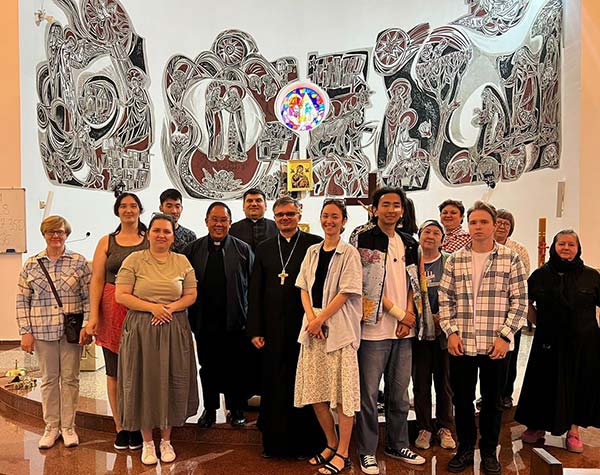
(ANS – Atyrau) – Fr Alfred Maravilla, General Councillor for the Missions, was on an exploratory visit to Kazakhstan from May 24 to 28, 2024, at the invitation of Fr Peter Sakmár, Apostolic Administrator of Atyrau. “I accepted the invitation because it is the task of the General Councillor for the Missions to explore new possible frontiers for the Congregation,” he explained. The General Councillor arrived on the solemnity of Mary Help of Christians. During the Eucharist in the main Church of the Apostolic Administration in Atyrau, he entrusted this visit to “She who did everything.”
As early as the 4th century, Christianity was present in this part of Central Asia, the world’s largest landlocked country, known today as “Kazakhstan.” Franciscan William of Rubruck traveled to Kazakhstan in 1254 and met Möngke Khan and Sartaq Khan, great-grandson of Genghis Khan. A few years later, Pope Nicholas III established the Diocese of Kipchak in the Kipchak steppe. The Kipchak people practiced Tengrism, but some of them converted to Christianity.
Paradoxically, it was Joseph Stalin, as leader of the Soviet Union, who caused a great increase in the Catholic population of Kazakhstan through the deportation of Catholics of Polish, German, and Lithuanian ethnicity and their clergy to the country’s concentration camps. Some of these priests helped to found the Church, which is the most widely used language in Russia.
In 1960, two officially registered Catholic churches were established. After the fall of communism in 1991, Pope John Paul II established an Apostolic Administration for all of Central Asia. But, after the fall of the Berlin Wall, many German Catholics returned to Germany, decreasing the Catholic population. In 1997, the other Central Asian countries became separate apostolic administrations. In 1999, Pope John Paul II divided Kazakhstan into a diocese and three apostolic administrations. In 2003, Pope John Paul II elevated the diocese of Astana, the capital, to an archdiocese and Almaty and Karaganda to a diocese. In 2020, 104 priests and 133 nuns served 81 parishes across the country.
Kazakhstan is a secular state whose Constitution guarantees religious freedom. “Discrimination on religious grounds” is prohibited, and everyone is guaranteed the “right to determine and indicate or not their ethnic, party and religious affiliation.” The recent census indicates that the total population is 20,075,271 people. 69.3% are Muslim and 17.2% are Christian. The free practice of religious belief and the establishment of full freedom of worship have led to an increase inreligious activity. Since 1990, hundreds of mosques, churches, and other religious structures have been built within a few years. There are conversions between “cultural Muslims” and “cultural Christians”, since conversion is a guaranteed constitutional right.
The Apostolic Administration of Atyrau is a sui iuris pastoral zone covering the western part of Kazakhstan, bordering Russia, Turkmenistan, and Uzbekistan. It has seven parishes spread over an area of 736,612 square kilometers (more than two times that of Italy). Most of the country’s oil fields are located in this western part. Catholics represent 0.1% (2,650) of the population of Western Kazakhstan. In many young people today there is a desire for transcendence and a search for something that cannot be identified. Therefore, the current situation is an excellent ground for the first proclamation of the Gospel and for pastoral care to strengthen the faith of the few Catholics.
Unlike other dioceses, the Church of Atyrau is really in its infancy. The seven parishes of the Apostolic Administration are small and far from each other. Some are only in houses without a real cult building. The challenge now is to reach the Kazakh-speaking ones. In fact, some of these parishes are located in places where 70% of the population is ethnic Kazakh. Diocesan priests from Poland, Slovakia, and the Philippines work in the Apostolic Administration. There is only one group of nuns working in Atyrau.
The Apostolic Administrator explained that he unsuccessfully sought the help of the male and female religious Congregations in the promising but demanding work of the first proclamation. He took Fr. Maravilla to visit some parishes and to meet some parishioners and young people. “I saw the need to reach young people, many of whom are looking for something they can’t name,” explained the General Councillor.
During their talks, he explained to the Apostolic Administrator the criteria of the Congregation for accepting the opening of a new presence in a country and the preferred beneficiaries of the Salesians of Don Bosco: young people, especially those who are poor, marginalised and at risk. “I just came for an exploratory visit. It is up to the Apostolic Administrator to take the next step,” he said. Fr Peter Sakmár assured that these criteria and the conditions presented by the General Councillor for the Missions will be discussed in their Presbyteral Council.
“The rest we leave to the Holy Spirit, who blows where he wants,” Fr. Maravilla concluded.

